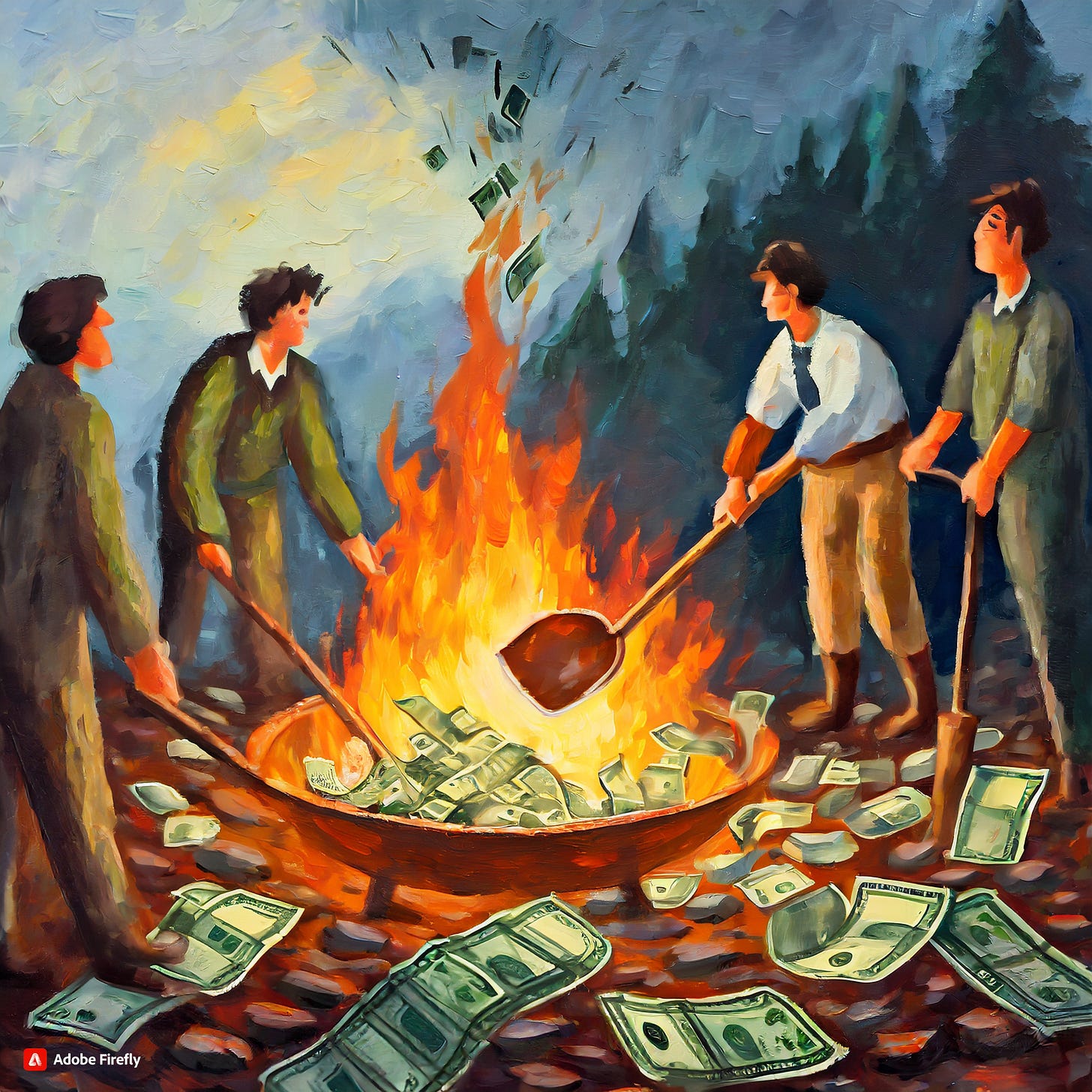BBC News Lies #5: Sending foreign aid to kleptocrats.
A grand new way to funnel your money out of the country.
Africa is in many ways a paradise; incredible wildlife, stunning and vast fauna, a wide variety of biomes and cultures. But many of those African nations are run by kleptocrats; political leaders that spend most of their tenure stealing from the very people that they mean to serve. It’s one of the primary reasons why Africa is still so poor today; their leaders not only steal money, but steal opportunity and liberty from from their brother and sisters in Africa. In this edition of BBC News Lies, I’ll be reviewing a flat and highly mainstream article that focuses on a White Paper produced by the governments development and Africa minister Andrew Mitchell. The White Paper outlines new strategies in foreign aid spending. As usual, the BBC misses a lot of key context, and never addresses any of the serious underlying questions that any investigative journalist should be asking. I’ll be asking some of the questions they should have, and you’ll get a much broader and contextual understanding as to what this White Paper is about and what it means for taxpaying Britons and the recipients of foreign aid.
UK government plans radical shake-up of foreign aid for climate change disasters - James Landale
“The UK government is to spend millions of pounds helping countries prepare for future humanitarian disasters in a radical shake-up of its development policy, the BBC has learned.
A new £150m fund will help poorer countries get access to money faster in emergencies and reduce the impact of future climate crises.”
With the United Kingdom producing less than 2% of the worlds CO2, too little is pushed back on by mainstream media. Britain could realistically sink into the sea, taking all of its people and infrastructure with it, and there would still not be a single dent on the worldwide output of CO2. Realistically, in the next ten years, only a tiny fraction of this tiny percentage will ever really change. It begs the question, why must British people be taxed to death, and then have a chunk of those tax “earnings” sent overseas to combat potential future “humanitarian disasters”? It’s a grandiose claim often not backed by any real logical imperative. There are unsound and vague arguments made about “leading by example”, and “behavioural change”, and “technological innovation” that get bandied around by those who believe Britain can make a dent in climate change. These aren’t clear goals or objectives; they’re political tripe designed to sell the population a problem in order to tax them to achieve the solution. The fact of the matter is, the fate of CO2 production in the world will not be decided by tens of millions of Brits; it will be decided by billions of the world’s poor people who will continue to burn everything from dung, to wood, to coal, to oil, in order to achieve a fraction of the living standards afforded to Westerners by abundant and cheap fuel.
Get one thing clear; most of these countries listed as recipients of aid are insanely corrupt. We’re talking about Somalia, Nigeria, Uganda, to name a few. There’s little to no chance that most if not all of the money and aid sent overseas isn’t almost immediately stolen. Where is the questioning on this? Where’s the investigation into these grandiose claims of preparing these countries for “future humanitarian disasters”? Most of these nations continue to be extremely poor because of how much wealth the corrupt elites steal from their own people, and how difficult their seemingly random rules and regulations make it for people to start the small businesses that are critical to growing an economy. Add to this the neverending, millenia old blood feuds between different groups, and you have a toxic recipe for this aid money causing more corruption and more conflict, and little chance of good. With governments being so shocking in their corruption that Mr Beast had to build water wells for school children, it’s clear that there are many dozens of obstacles that Africa needs to overcome itself before development can make an impact.
“The change is expected to be part of a new White Paper designed to make Britain's foreign aid spending go further while also finding new sources of international finance.
Ministers hope the 140-page policy document - published on Monday - can help restore Britain's reputation as a development superpower after years of aid cuts.”
They said development superpower! A status quo that must be maintained… why? Why is this desirable for the United Kingdom? As homeless zombie drug addicts roam our streets, as veterans and young men take their own lives in quiet desperation, as the NHS slowly rots from the inside, why has this become such a massive and growing focus of British taxpayer money? Politicians are extremely generous with other people’s money, as UK taxpayer already shells out over £10bn a year that disappears into the money pit that is foreign aid. Although it could easily be classed as reductive to argue where money could or should be spent, the focus on foreign countries in both energy and resources is insulting considering the vast array of social, cultural, and economic problems that exist within our own island. Would it be such an offensive crime to suggest that Britain mind its own business around the world, and try to focus on righting some of the wrongs at home?
We cannot forget that a great deal of the money sent overseas, tens of millions, ends up in Pakistan, a country with nuclear weapons. This cannot possibly be a defensible position; all of the slack picked up by British taxpayers is a direct subsidy to a nuclear weapons program owned by a nation that often flirts with hostility with the West. Not only the West, but with India most specifically (another nuclear armed foreign aid recipient). It’s no secret the animosity that India and Pakistan have for each other in many ways, and the unthinkable is only that way until it happens. On a moral note, it’s not right to be taking money off of British people to send to nuclear armed foreign nations in any capacity. Billions of pounds are poured into nations that spend billions of pounds on city flattening and apocalyptic nuclear weapons, and it’s not remotely justifiable. If they can afford nukes, then they are big enough boys to sort out their own civil problems.
““The central idea of the White Paper is that conflict, climate and Covid have changed and blighted the world so much that countries must think differently about development.”
It will argue that instead of wealthier states just handing out money, they should form new partnerships with developing countries - based on mutual respect - within an international system that finances new ways of tackling extreme poverty.”
There’s a very sly threat here; imagine a mob boss approaching you with investment for your little business, but so long as you work “in partnership” with them. What does that mean? Well it’s partly an admission that the UK are fully aware that a sizeable chunk of foreign aid money and resources gets stolen through corruption, and partly a “my way or the highway” threat. The corruption alone is getting difficult to ignore, try as they might. A Public Sector Fraud Authority report in 2023 would go on to reveal that in 22 of the countries receiving foreign aid, a mind-blowing 16% of all foreign aid ended up in offshore bank accounts alone. This would represent a chunk of the theft, but is unlikely to even be a majority of it. These are just the ones that got caught too; truth is, when you’re talking about countries like Nigeria, Afghanistan, Pakistan, or Ethiopia (the top 4 recipients of UK aid), there are a colossal number of intricately layered ways in which fraud can occur that the UK could never even begin to understand. To exercise the point, please read the “Aftermath and Trial” section of this Wikipedia article on Emmanuel Nwude, where you’ll be taken on a most bizarre rollercoaster of insanely deep corruption and fraud only possible in Nigeria. He’s certainly not the only one; Mohammed Farah Aidid, a brutal Somali warlord, stole roughly 80% of the UN foreign aid sent to Mogadishu. It made him more powerful made the famine worse, and consolidated his control over the capital city. Former President Mobutu Sese Seko stole roughly $5bn in foreign aid during his tenure as leader of Zaire (now DRC) as his country starved. This was precisely half of all IMF loans given to Zaire. Denis Sassou Nguesso is another DRC leader and recipient of foreign aid. As his people suffered, Nguesso certainly didn’t; he owned 16 luxury apartments and houses in Paris, with 111 bank accounts, and a lot of this was foreign aid money. Ali Bongo Ondimba, president of Gabon, also received vast foreign aid money, whilst also owning 39 luxury properties in Paris. These people are a fraction of the tip of the iceberg, and most countries in Africa are exactly the same. Those 4 top recipients of UK aid are so insanely corrupt that it’s impossible to imagine even a small chunk of the money going towards something other than luxury vehicles and homes for their leaders.
The corruption problem is compounded not just by the act of theft, but by all of the people trying to get their share of the sloshing aid money. It’s not just that there’s a % of loss here or there; it’s that these frauds are directly funding gangsters and violent militias that would otherwise not exist. it creates civil conflict too; it’s difficult to imagine how much civil violence and conflict has been fuelled by politicians and warlords who tried to get their hands on those valuable foreign aid resources. For the government also, there is an absolving of responsibility for fixing even the most basic problems in their communities. Best believe that those leaders live in total luxury as many people do not have access to clean water. But maybe this is how those countries like to run themselves; maybe in their culture, they don’t care that there’s dirty drinking water in rural areas, so long as their capital and their leaders appear powerful. We’re applying a lot of Western logic and humanities to a place that is alien to the West, and maybe we have no right to interfere.
“So a drought-stricken country would not just get emergency food and water in the short term, but also investment in wells and reservoirs to help reduce the impact and cost of future emergencies.
There are also plans for special insurance schemes and pre-agreed contingency funds to ensure countries can get access to humanitarian cash the moment disaster strikes, instead of having to wait for donor countries to raise the money which can take some time.”
Why does the BBC journo not even begin to question these slosh funds mixing with ultra corrupt foreign dictators? After all, this is certainly a known unknown, and not a secret. What on Earth makes the journo believe for a second that African leaders will spend that money wisely? Take the Belt & Road Initiative from China; massive chunks of the money allocated to development got spent on white elephant carbuncles. It’s a tale as old as time when it comes to financially illiterate and corrupt governments getting hold of a load of cash. As they all begin to default on China, missing payment after payment and requiring bailouts, why was there not even a single bit of pushback asking as to the efficacy of giving money to people we fully know to be both incompetent and ultra corrupt? The concept of including insurance schemes and contingency funds just reeks of potential for more corruption; it’s never really a matter of if the money is stolen, but how.
“Developing countries may also automatically be able to stop paying back international debts in times of crisis.
The White Paper is expected to set out plans to unlock more private finance to help the world meet the United Nations sustainable development goals, known as SDGs.
These plans - to cut poverty, hunger and inequality and boost education, health and climate action - were agreed in 2015. But the targets are considered widely off track and unlikely to be met by their 2030 end date.”
One thing we all have been aware of since forever; goals, targets, and end dates are never met by any government. It makes these kind of projects their own mini white elephants in pursuit of larger white elephants. We spend more money than we budget for, get worse results, and it takes far longer than ever projected. This is true across almost the whole board; from HS2 to SDGs to Test & Trace to anything the government sets its sights on. They make nice headlines, and then failures are quickly brushed under the carpet in a flurry of new promises.
The beginning line on that quote is also a quick one, and shouldn’t be missed. The White Paper for these new foreign aid goals include allowing these insanely indebted and ultra corrupt nations to pause debt repayments during times of crisis. Well, show me an incentive, and I’ll show you a result; prepare for a wave of never-ending crises to start showing up all over the recipients of these loans. The money will always eventually fall into corrupt hands, be it through shoddy workmanship, embezzlement, “back-payments”, and even just straight up theft.
“The government's development and Africa minister, Andrew Mitchell, said Monday's White Paper should be seen as a restatement of the value of aid and a glimmer of hope in dark times.
"Our world is troubled and fragmented," he said. "Do we give up on it? Or do we act?””
The last takeaway here is the bizarre discovery that we have a minister for “development and Africa”. It’s the snottiest of titles I’ve ever heard; a white saviour complex that’s so deep that they don’t even see how ridiculous a title this is. How about having diplomatic relations with the recognised governments of those nations, and leaving them alone to their business? It feels so colonial; why are we getting so intimately involved in foreign nations? Is it possible there are many ways in which we’re causing harm? How much of the money really makes it to those in need? These insurances schemes and funding requirements serve only as new obstacles for inevitable corruption to traverse, whilst also making it harder for legitimate cases to receive any money. There is probably no more naive a government office as one titled “development and Africa”.
Ultimately, what the biggest question to ask is, are we funding dependency, corruption, and increased civil strife? It’s likely. We are certainly taking more than £10bn out of the hands of British people to fund it. This is nearly double the money we spend on prisons, it’s about 80% of the money we spend on police, a quarter of what we spend on the military. Money taken from British taxpayers should only be spent in Britain. Foreign aid charity should be a choice for individuals to make. Organisations I donate to include Médecins Sans Frontières and War Child; and considering the British people privately donate over £10bn a year to charity, I’m not the only one. We are a kind and charitable culture, with philanthropy deep in the core of who we are. But it is not for an untrustworthy and barely accountable government to be making charity decisions on our behalf, much of which ends up in the pockets of ultra corrupt foreign governments. Remember the title of this publication. They are not to be trusted.







